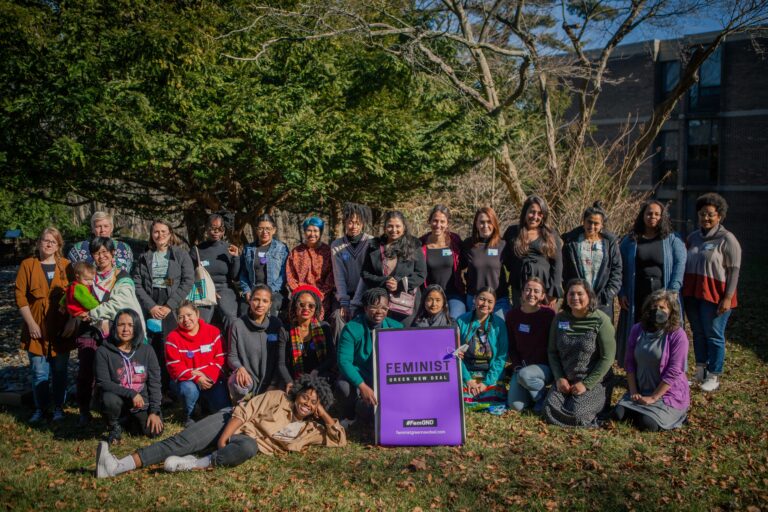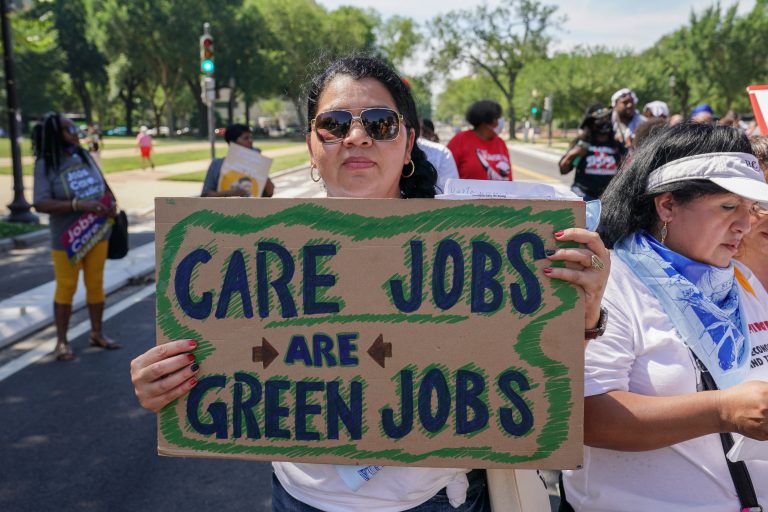Feminist Green New Deal Coalition Releases Issue Brief Highlighting Intersection of Care Work and Climate Action
Landmark brief makes the case for investment in high-quality jobs in the care sectors of our economy, including childcare, residential care, and home healthcare, as part of a climate and infrastructure package
Today, the Feminist Green New Deal Coalition is launching an Issue Brief, “Care & Climate: Understanding the Policy Intersections.” This brief brings new analysis to the discourse around climate investment and infrastructure, arguing that policy design must be attentive to the role that care infrastructure must play in just economic recovery and for gender and racial justice.
Authored by Rhiana Gunn-Wright, Director of Climate Policy at the Roosevelt Institute and one of the authors of the Green New Deal, and Lenore Palladino, Assistant Professor of Economics & Public Policy at the University of Massachusetts Amherst, the brief builds on the growing momentum around expanding and investing in national care infrastructure, from President Biden’s inclusion of elder care in his infrastructure plan to Congressman Bowman and Senator Warren’s recent release of the Care for All Agenda.
“To build the world our kids deserve, and to deal with the climate crisis we’re facing, we need a paradigm shift in how we treat care work,” said Congressman Jamaal Bowman, a champion of care infrastructure and climate justice. “We need an economy that values and prioritizes healing, not the current system of plantation capitalism that is destroying the planet and our people in order to concentrate obscene amounts of wealth in the hands of a few. Let’s treat care work as what it is — infrastructure — and invest in those jobs and workers so that we can build a truly sustainable economy.”
Included in this Issue Brief are analyses of the THRIVE Agenda and the current Biden-Harris Administration proposals for investment in care and climate resilience and a set of initial suggestions for strengthening the proposals made by the Biden-Harris Administration. In addition to more explicitly recognizing the importance of care infrastructure in a jobs plan, this brief calls for the Administration to ensure that care jobs are paid, high-quality, green jobs that contribute to climate resilience.
About the Authors
Lenore Palladino is Assistant Professor of Economics & Public Policy at the University of Massachusetts Amherst.
Rhiana Gunn-Wright is the Director of Climate Policy at the Roosevelt Institute. She is one of the authors of the Green New Deal and founder of the Climate Policy Nexus and the Green New Deal Network.
Supporting Quotes
- “The care and climate brief is an informative and timely intervention that transforms the way we think about social reproduction, care infrastructure, clean energy, and decarbonization. Gunn-Wright’s and Palladino’s recommendations are essential pivot points that can guide the Biden-Harris administration in adequately and equitably addressing the triple crisis of care, climate, and COVID.” –Frances Roberts-Gregory, Future Faculty Fellow, Northeastern University
- “This brief articulates the connections between two of the greatest crises facing our country, showing that care work is climate work, and vice versa. We need to ensure that the future is grounded in gender and racial justice, and I hope these recommendations will be used to light our path forward on both care and climate change.” – Julie Kashen, senior fellow and director of Women’s Economic Justice at The Century Foundation.
- “We must visibilize care — an unrecognized cost of sustaining our communities and our national and global infrastructure, yet often undervalued because it is largely performed by women and girls of color. Care is crucial low-carbon work that must be centered and uplifted in a just transition to a green economy. As we call for investing in the care economy here within the US, we must address the ways that the US undermines care internationally. That means tackling broad economic sanctions that place food and medicine out of reach for women working to sustain their families, and calling for economic policies such as debt cancellation that free up resources for countries to invest in their health systems and social infrastructure.” – Yifat Susskind, Executive Director of MADRE
- “We are in a moment of understanding what counts as infrastructure and further – what counts as “green jobs”, said Bridget Burns, Director of the Women’s Environment and Development Organization (WEDO). “This Brief foregrounds work that is community-centered, low-carbon, and critical to the future we need to build, where people and planet are cared for. Care jobs are green jobs just as care infrastructure is climate infrastructure.”
- “Patriarchy and capitalism are inextricably linked with the climate crisis and responses to the COVID-19 pandemic, and women’s labor across all sectors continues to be undervalued and invisibilized in these ongoing crises. Investing in a feminist care economy is necessary for a Just Transition, clean energy, decarbonization of our economies, and healthy communities. The world over, women are advocating for circular, care economies and earth-centered economic models like Buen Vivir that confront colonial, capitalist frameworks, and instead seek comprehensive, systemic change founded upon care for people and planet for generations to come.” Osprey Orielle Lake, Executive Director of the Women’s Earth and Climate Action Network (WECAN)
- “As our population ages and the vast majority of people prefer to live and age with dignity in our homes and communities, home care workers are increasingly needed. As we’ve seen in the COVID-19 pandemic, nursing homes are not the safest setting for most people, but many more will be forced into institutions if we don’t invest in making home care jobs living wage jobs, because right now the pay is criminally low, and the people are leaving the workforce in droves right when we need them most. Home care workers are essential to our care infrastructure – investing in making home care jobs quality jobs will address our home care shortage and allow seniors and people with disabilities to stay out of dangerous nursing homes and age safely and with dignity in their own homes. It will also create millions of carbon neutral jobs for women, immigrants and people of color. and support a workforce that is often at the front lines of climate crises.” – Ilana Berger, NY Director Hand in Hand: The Domestic Employers Network & Campaign Co-Director NY Caring Majority
- “As a new pandemic mom, I experienced just how urgent the need for care work to be paid, seen and valued. We need to transform our economy to support women, to invest in our future, and to protect our environment. These issues are deeply related and need to be better understood. I’m glad to see the climate and the care economy knitted together and hope our action on both can be at the scale required to transform our future.” – A.Tianna Scozzaro, Director of the Gender Equity and Environment Program at the Sierra Club


